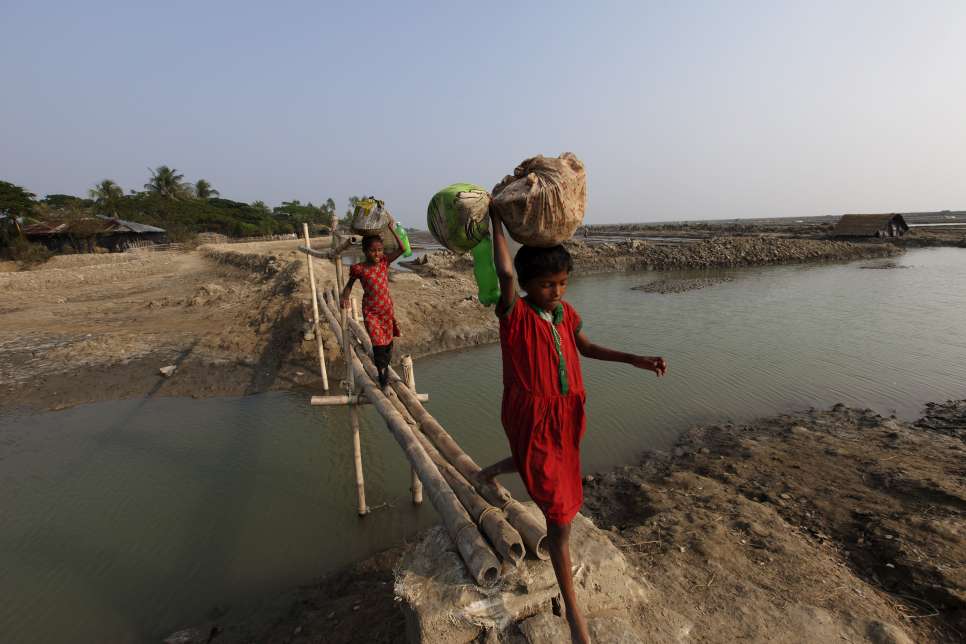Environment, Disasters and Climate Change
Since the 1990s, we have become increasingly committed to protecting the environment and of the environmental challenges associated with hosting a large population in a small area. Over the course of the last two decades, we have set in place programmes and initiatives aimed at improving sustainable environmental management, aiming to reduce environmental degradation and enhance the resources available to the displaced, as well as host communities.
Disasters and climate change are a growing concern. Since 2009, an estimated one person every second has been displaced by a disaster, with an average of 22.5 million people displaced by climate or weather-related events since 2008 (GRID 2018). The Intergovernmental Panel on Climate Change, the UN's science advisory board, projects an increase in the number of displaced over the course of this century. The majority of the people of concern to UNHCR are concentrated in the most vulnerable areas around the world. Climate change will force people into increasing poverty and displacement, exacerbating the factors that lead to conflict, rendering both the humanitarian needs and responses in such situations even more complex.
We are deeply concerned about the massive protection challenges raised by disasters and climate-related related displacement, and work with other agencies and a range of partners to protect those at risk.
UNHCR’s role in Climate Action
In January 2020, the High Commissioner for Refugees appointed Andrew Harper as the Special Advisor on Climate Action. He drives UNHCR’s engagement on the climate emergency, serves as a global advocate, and is responsible for providing oversight and expertise to shape UNHCR's climate action agenda.
Our climate action is focused on three main areas:
- Law and policy. Providing legal advice, guidance and support to the international community to develop enhanced protection for refugees and other people displaced in the context of disasters and climate change, and catalyzing international discussions on their rights.
- Operations. We strive to improve the predictability of our engagement to anticipate and prepare for emergencies brought on by climate-related and other natural hazards, including through strong partnerships. We are committed to reducing environmental degradation in displacement settings and enhancing the preparedness and resilience of displaced people and host communities to the effects of climate change. Learn more about the Refugee Environmental Protection Fund, which will invest in impactful reforestation and clean cooking programs in climate-vulnerable refugee situations around the world. We incorporate climate and environmental consideration in our operational responses. We are also working to “green” our end-to-end supply chain and to improve our supply planning, as well as the sourcing, contents, manufacturing process, procurement and delivery and lifecycle management of core relief items and other UNHCR goods. Read our Operational Strategy for Climate Resilience and Environmental Sustainability 2022-2025 and the Strategy summary here.
- UNHCR’s environmental footprint. Improving UNHCR’s environmental sustainability by reducing our greenhouse gas emissions and minimizing negative impacts on the environment.
Read UNHCR’s Strategic Framework for Climate Action
In photos: Battling the elements in Chad
23 November 2005
Over 180,000 Sudanese refugees have fled violence in Darfur, crossing the border into the remote desert of eastern Chad.
It is one of the most inhospitable environments UNHCR has ever had to work in. Vast distances, extremely poor road conditions, scorching daytime temperatures, sandstorms, the scarcity of vegetation and firewood, and severe shortages of drinkable water have been major challenges since the beginning of the operation. Now, heavy seasonal rains are falling, cutting off the few usable roads, flooding areas where refugees had set up makeshift shelters, and delaying the delivery of relief supplies.
Despite the enormous environmental challenges, we have managed to establish nine camps and relocate the vast majority of the refugees who are willing to move from the volatile border.
-
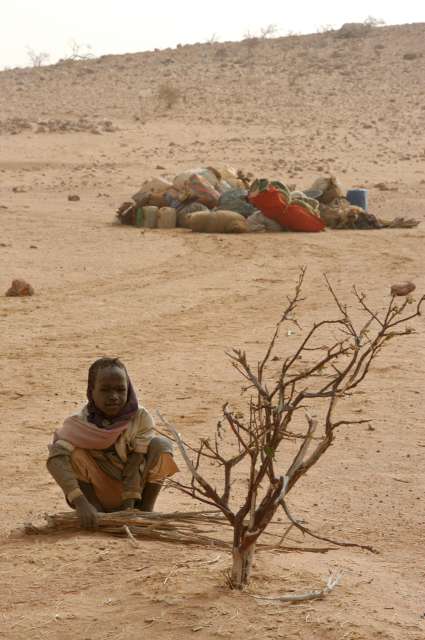 More than 180,000 refugees have fled © UNHCR/H.Caux
More than 180,000 refugees have fled © UNHCR/H.Caux -
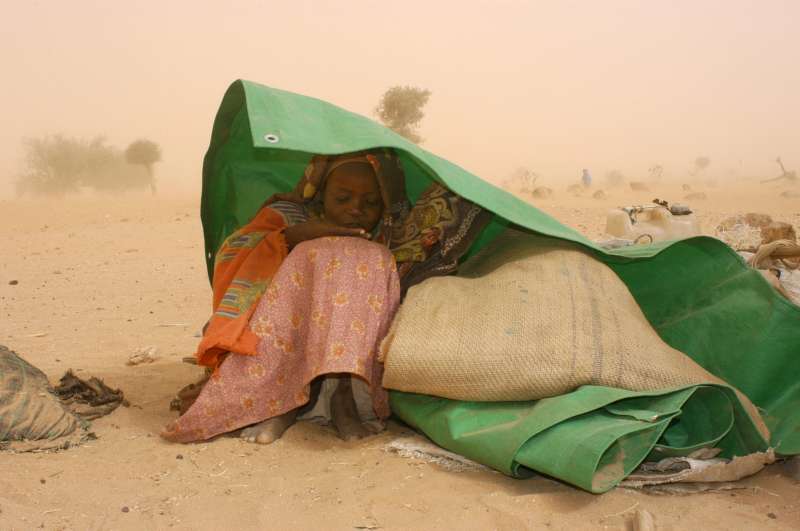 A Sudanese refugee seeks shelter from a sandstorm near the Chadian border town of Tine. (February 7, 2004) © UNHCR/H.Caux
A Sudanese refugee seeks shelter from a sandstorm near the Chadian border town of Tine. (February 7, 2004) © UNHCR/H.Caux -
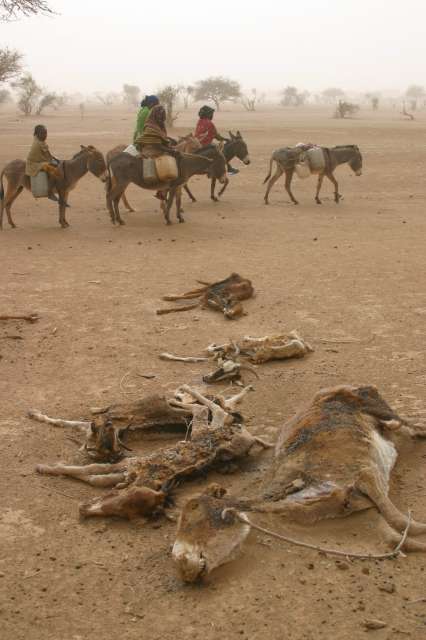 Many livestock brought by the refugees © UNHCR/B.Heger
Many livestock brought by the refugees © UNHCR/B.Heger -
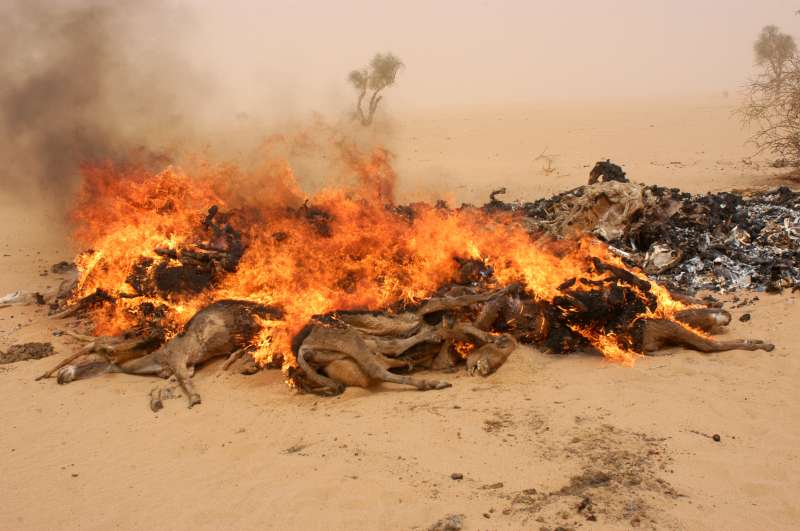 Humanitarian agencies burn carcasses of donkeys, cows and goats that have died from exhaustion, dehydration and starvation, to prevent the decaying bodies from contaminating water supplies and increasing the risk of disease among the refugees. © UNHCR/H.Caux
Humanitarian agencies burn carcasses of donkeys, cows and goats that have died from exhaustion, dehydration and starvation, to prevent the decaying bodies from contaminating water supplies and increasing the risk of disease among the refugees. © UNHCR/H.Caux -
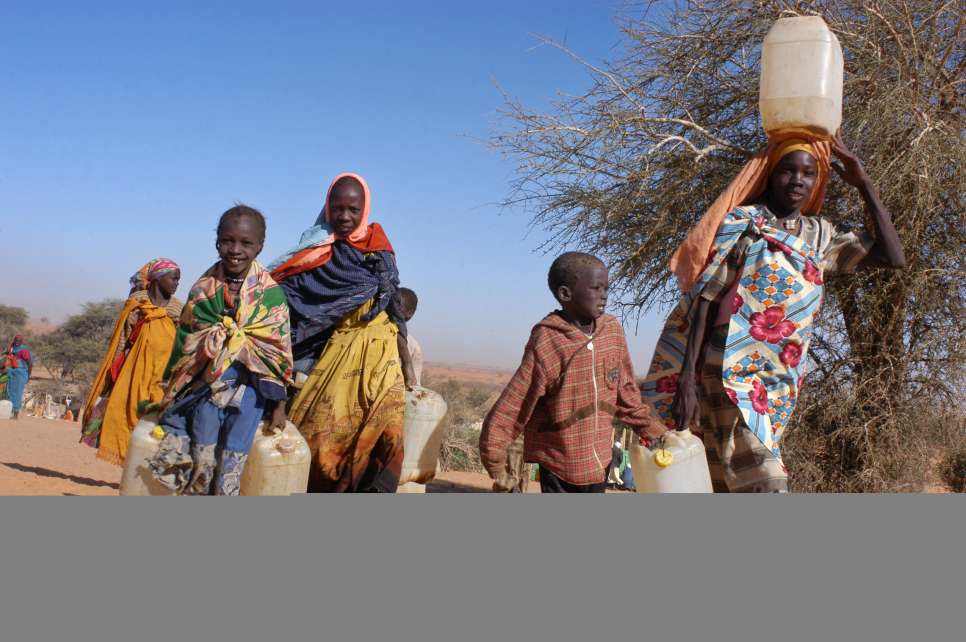 Refugees carrying plastic jerry cans head out to the water tap in Touloum camp to collect water for their daily needs. UNHCR and its partners have struggled to find campsites with sufficient water supply for tens of thousands of refugees in the desert region. (March 19, 2004) © UNHCR/H.Caux
Refugees carrying plastic jerry cans head out to the water tap in Touloum camp to collect water for their daily needs. UNHCR and its partners have struggled to find campsites with sufficient water supply for tens of thousands of refugees in the desert region. (March 19, 2004) © UNHCR/H.Caux -
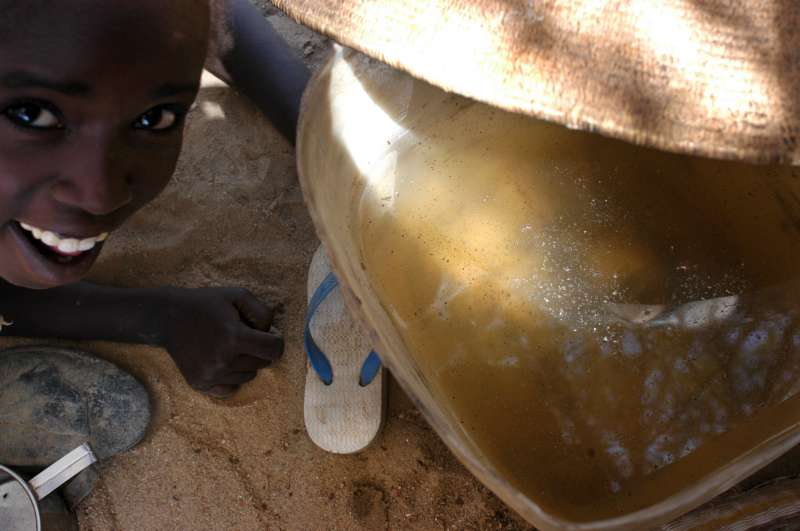 A refugee boy with untreated water collected from a local well in the border town of Bahai. UNHCR relocated refugees from the Bahai area to a camp at Oure Cassoni where safer, treated water is provided. (July 4, 2004) © UNHCR/H.Caux
A refugee boy with untreated water collected from a local well in the border town of Bahai. UNHCR relocated refugees from the Bahai area to a camp at Oure Cassoni where safer, treated water is provided. (July 4, 2004) © UNHCR/H.Caux -
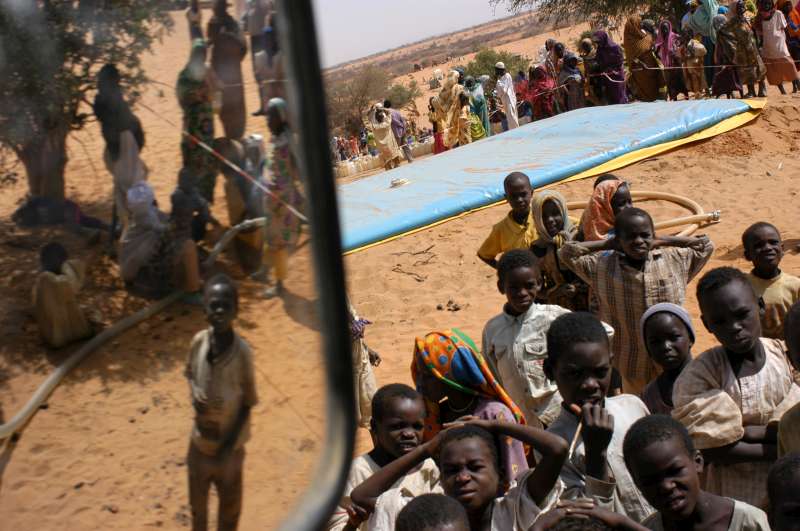 Refugee children at Touloum camp wait for the water bladder to be filled. Every day, water is trucked to the camp to meet the needs of the refugees, while aid agencies continue to drill in search of new water sources at the camp itself. (April 24, 2004) © UNHCR/H.CAux
Refugee children at Touloum camp wait for the water bladder to be filled. Every day, water is trucked to the camp to meet the needs of the refugees, while aid agencies continue to drill in search of new water sources at the camp itself. (April 24, 2004) © UNHCR/H.CAux -
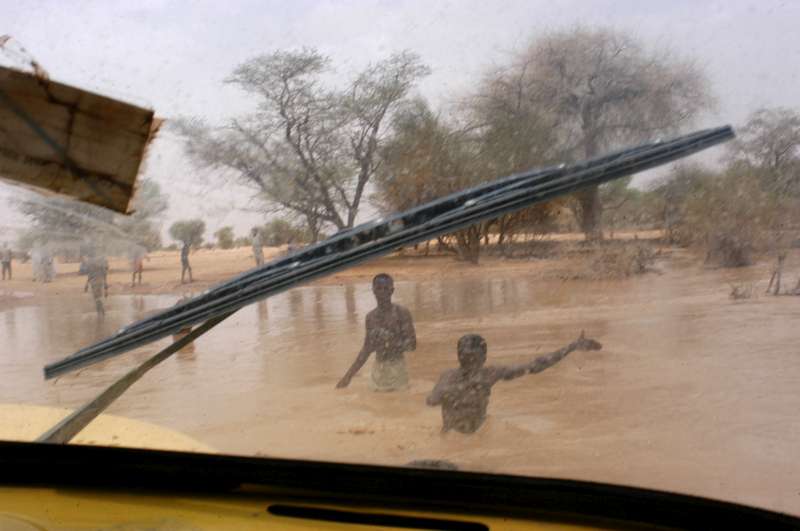 Heavy seasonal rains have started falling in eastern Chad, flooding normally parched riverbeds and cutting off roads, further complicating relief efforts. Flooding has added hours and even days to journeys by road between the refugee camps, the border, and UNHCR's office and warehouses in the region. (July 18, 2004) © UNHCR/H.Caux
Heavy seasonal rains have started falling in eastern Chad, flooding normally parched riverbeds and cutting off roads, further complicating relief efforts. Flooding has added hours and even days to journeys by road between the refugee camps, the border, and UNHCR's office and warehouses in the region. (July 18, 2004) © UNHCR/H.Caux -
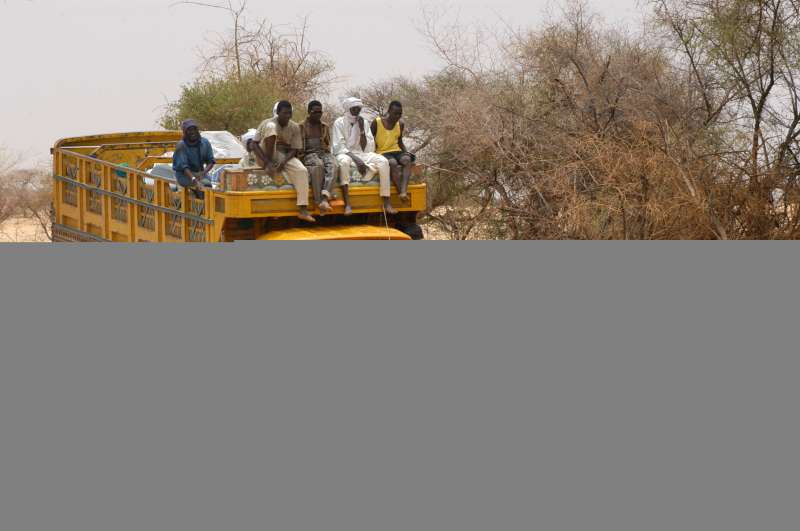 A truck rented by UNHCR to transport aid supplies and relocate refugees from the border to the refugee camps attempts to rescue an NGO car stuck in the flooded river bed between Bahai and Tine. (July 18, 2004) © UNHCR/H.Caux
A truck rented by UNHCR to transport aid supplies and relocate refugees from the border to the refugee camps attempts to rescue an NGO car stuck in the flooded river bed between Bahai and Tine. (July 18, 2004) © UNHCR/H.Caux -
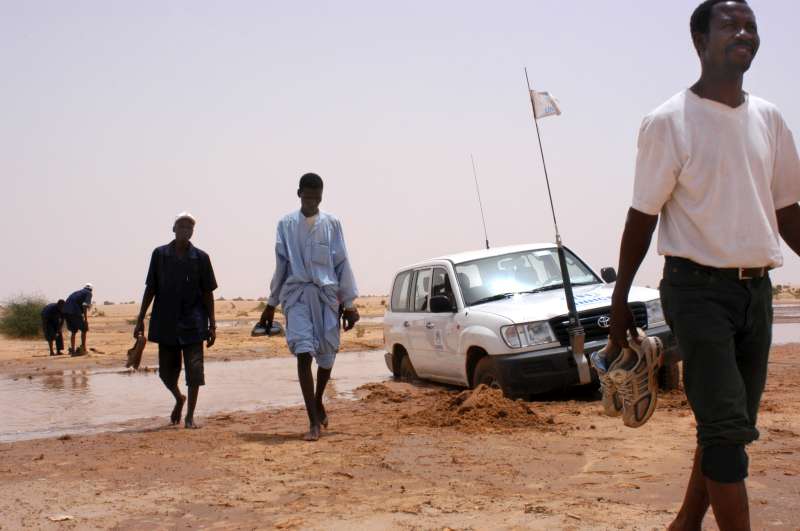 UNHCR and Red Cross workers continue by foot across the seasonal riverbed where a UNHCR vehicle got stuck. It took four hours for two cars and a truck to liberate the trapped vehicle. (July 16, 2004) © UNHCR/H.Caux
UNHCR and Red Cross workers continue by foot across the seasonal riverbed where a UNHCR vehicle got stuck. It took four hours for two cars and a truck to liberate the trapped vehicle. (July 16, 2004) © UNHCR/H.Caux -
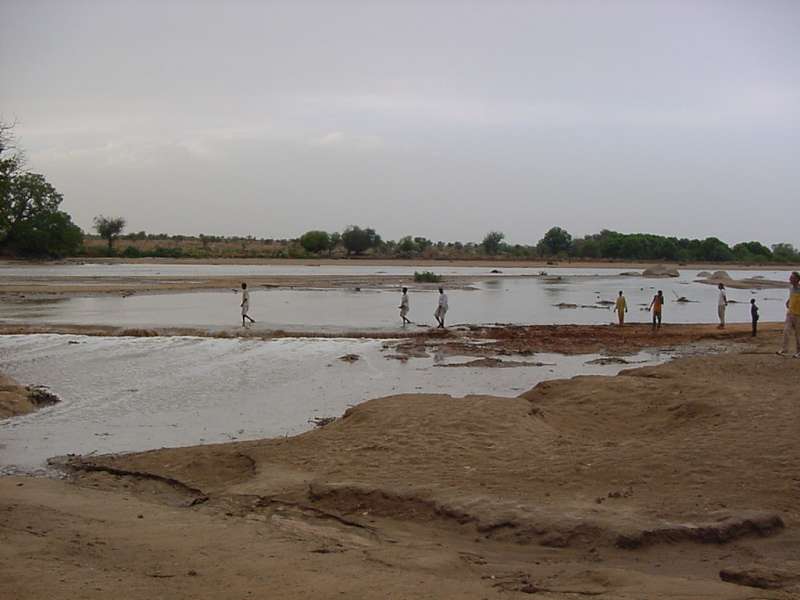 Seasonal rains flood the road between Farchana camp and the main eastern Chad town of Abéché. (June 2004) © UNHCR/D.Shrestha
Seasonal rains flood the road between Farchana camp and the main eastern Chad town of Abéché. (June 2004) © UNHCR/D.Shrestha -
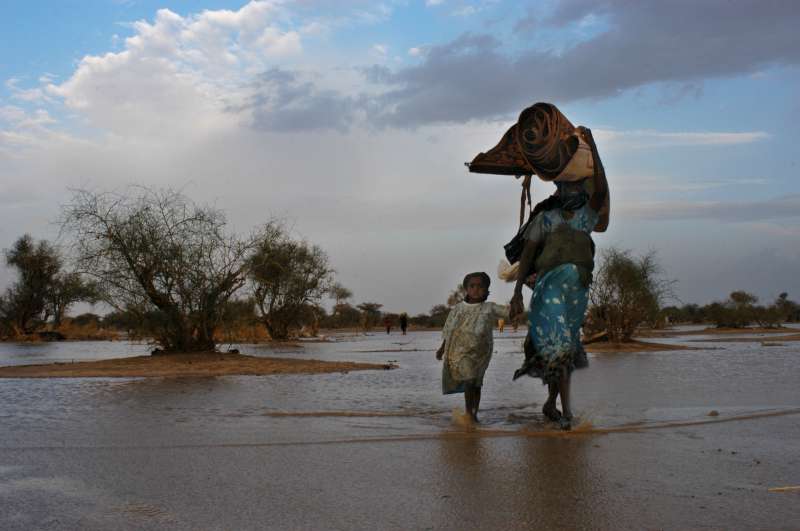 A refugee family carrying their belongings out of the water after their makeshift shelter was flooded when the first heavy rains near Bahai swelled the seasonal riverbed. The flooded-out refugees were immediately transferred to a new camp that had just opened to receive them. (July 14, 2004) © UNHCR/H.Caux
A refugee family carrying their belongings out of the water after their makeshift shelter was flooded when the first heavy rains near Bahai swelled the seasonal riverbed. The flooded-out refugees were immediately transferred to a new camp that had just opened to receive them. (July 14, 2004) © UNHCR/H.Caux

